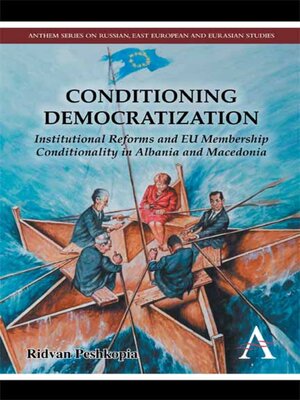Conditioning Democratization
ebook ∣ Institutional Reforms and EU Membership Conditionality in Albania and Macedonia · Anthem Series on Russian, East European and Eurasian Studies
By Ridvan Peshkopia

Sign up to save your library
With an OverDrive account, you can save your favorite libraries for at-a-glance information about availability. Find out more about OverDrive accounts.
Find this title in Libby, the library reading app by OverDrive.



Search for a digital library with this title
Title found at these libraries:
| Library Name | Distance |
|---|---|
| Loading... |
This book analyzes the effects of European Union membership conditionality on institutional reforms in Eastern Europe, building on concrete examples from four sectors in Albania and Macedonia, two postcommunist countries that have yet to join the EU. The author discusses the theory of "consociational democracy," often considered the key to stabilizing deeply divided countries, and reapplies it on the international stage to argue for how the EU can better direct democratization.
|How much, and under what conditions, can the European Union affect democratization and democratic consolidation in prospective member states? What mechanisms does the EU employ to influence reforms in countries emerging from authoritarian rule? Focusing on Albania and Macedonia, two postcommunist countries with a legacy of internal conflict, "Conditioning Democratization" analyzes the relationship between EU accession conditionality and institutional reforms. It focuses on four sectors of reform that are often overlooked in other studies: constitutions, asylum, local decentralization and the judiciary system.
The volume critically reviews the theory of "consociational democracy," often considered the key to stabilizing deeply divided countries, and reapplies it to the supranational institution of the European Union. In articulate, accessible prose, Ridvan Peshkopia builds on examples from multiple sectors in multiple countries to reconceptualize this theory and show that the EU can indeed use membership conditions as a tool to encourage and direct reform.







